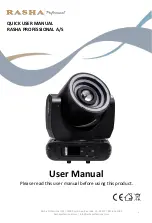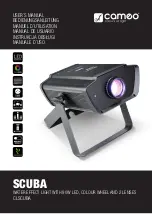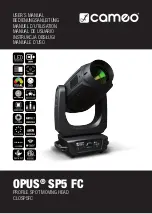
Mega Flash DMX™
DMX Set Up
©
American DJ
® -
www.americandj.com - Mega Flash DMX™ Instruction Manual Page 5
Power Supply:
Before plugging your unit in, be sure the source volt-
age in your area matches the required voltage for your American DJ
®
Mega Flash DMX.™ The American DJ
®
Mega Flash DMX
™
is 120v only.
Because line voltage may vary from venue to venue, you should be
sure your unit voltages matches the wall outlet voltage before attempt-
ing to operate you fixture.
DMX-512:
DMX is short for Digital Multiplex. This is a universal pro-
tocol used as a form of communication between intelligent fixtures
and controllers.
A DMX controller sends DMX data instructions from
the controller to the fixture. DMX data is sent as serial data that trav-
els from fixture to fixture via the DATA “IN” and DATA “OUT” XLR ter-
minals located on all DMX fixtures (most controllers only have a DATA
“OUT” terminal).
DMX Linking:
DMX is a language allowing all makes and models of
different manufactures to be linked together and operate from a sin-
gle controller, as long as all fixtures and the controller are DMX com-
pliant.
To ensure proper DMX data transmission, when using several
DMX fixtures try to use the shortest cable path possible. The order
in which fixtures are connected in a DMX line does not influence the
DMX addressing. For example; a fixture assigned a DMX address of 1
may be placed anywhere in a DMX line, at the beginning, at the end,
or anywhere in the middle. When a fixture is assigned a DMX address
of 1, the DMX controller knows to send DATA assigned to address 1
to that unit, no matter where it is located in the DMX chain.
Dipswitches in DMX mode:
This unit uses dipswitches to assign a
DMX address. Each dipswitch represents a binary value.
Dipswitch 1 address equals 1
Dipswitch 2 address equals 2
Dipswitch 3 address equals 4
Dipswitch 4 address equals 8
Dipswitch 5 address equals 16
Dipswitch 6 address equals 32
Dipswitch 7 address equals 64
Dipswitch 8 address equals 128
Dipswitch 9 address equals 256
Dipswitch 10 - Some units omit dipswitch 10. When a unit does
include dipswitch #10, it is usually used for special functions such as
Mega Flash DMX™
DMX Set Up
©
American DJ
® -
www.americandj.com - Mega Flash DMX™ Instruction Manual Page 6
sound activation.
Assigning DMX Address:
Each dipswitch has a preset value. A spe-
cific DMX address is set by combining the dipswitches that sum your
desired value. For example: To achieve a DMX address of 7, combine
dipswitches 1, 2, and 3. Since dipswitch 1 has a value of 1, dipswitch
2 has a value of 2, and dipswitch 3 has a value of 4, the combination
of the three create a DMX value of 7. (See example below).
Set DMX address 1:
Set DMX address 7:
Dip-switches # 1 = 1
Dip-switches # 1 = 1
2 = 2
3 = 4
= 7
Data Cable (DMX Cable) Requirements (For DMX
and Master/Slave Operation):
The Mega Flash
DMX™ can be controlled via DMX-512 protocol.
The Mega Flash DMX™ is a two channel DMX
unit. The DMX address is set on the side panel of
the Mega Flash DMX™ Your unit and your DMX
controller require a standard 3-pin XLR connec-
tor for data input and data output (Figure 1). If you
are making your own cables, be sure to use standard two conductor
shielded cable (This cable may be purchased at almost all pro sound
and lighting stores). Your cables should be made with a male and
female XLR connector on either end of the cable. Also remember that
DMX cable must be daisy chained and can not be split.
Notice:
Be sure to follow figures two and three when making your own
cables. Do not use the ground lug on the XLR connector. Do not con-
nect the cable’s shield conductor to the ground lug or allow the shield
conductor to come in contact with the XLR’s outer casing. Grounding
the shield could cause a short circuit and erratic behavior.
DMX512 IN
3-PIN XLR
SOUND
REMOTE
CONTROL
INPUT
POWER
INPUT
OUTPUT
SOUND
REMOTE
CONTROL
INPUT
POWER
INPUT
OUTPUT
SOUND
REMOTE
CONTROL
INPUT
POWER
INPUT
OUTPUT
DMX512
DMX+,DMX-,COMMON
1
2
3
Termination reduces signal errors and
avoids signal transmission problems
and interference. It is always advisable
to connect a DMX terminal, (Resistance
120 Ohm 1/4 W) between PIN 2 (DMX-)
and PIN 3 (DMX +) of the last fixture.
1
2
3
1
2
3
DMX +
DMX -
COMMON
DMX512 OUT
3-PIN XLR
Figure 2
Figure 1
























